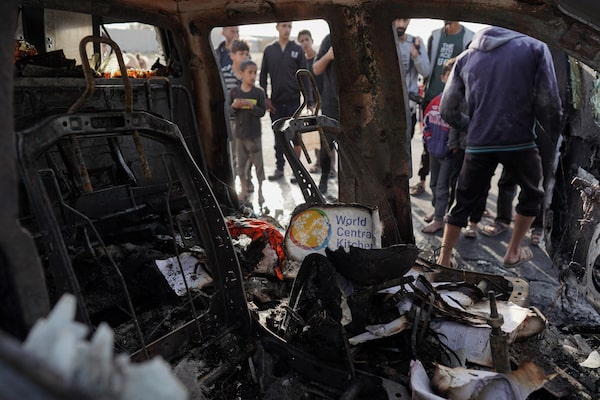WCK members prepared food for Palestinians. Before the air strike, they operated dozens of community kitchens in Gaza.@chefjoseandres/X, formerly Twitter, via REUTERS
Celebrity chef José Andrés has always viewed his non-profit World Central Kitchen as filling a niche during times of crisis.
“We have a comprehensive approach,” Mr. Andres told The Globe and Mail during a visit to Kyiv in August, 2022. “We are an emergency, not a hunger organization. We are very unique in emergencies.”
This role means the charity’s staff have faced plenty of danger. On Monday night, seven WCK workers in Gaza, including Jacob Flickinger, a 33-year-old Canadian-American, were killed by an Israeli missile strike on a food convoy. Four WCK workers were wounded in Ukraine in 2022 when a Russian missile hit one of its restaurants in Kharkiv.

People in Deir al-Balah, a city in central Gaza, survey the wreckage of a World Central Kitchen vehicle on April 2, a day after an Israeli air strike destroyed it. Seven members of the aid group were killed, including a dual citizen of Canada and the United States.AFP via Getty Images
Most people know Mr. Andrés not for his charitable work, but for his many award-winning eateries. Born in Spain, Mr. Andrés went to culinary school in Barcelona as a teenager and then joined the navy as a cook. He headed to the United States at the age of 23 and quickly made a name for himself after opening Jaleo in Washington in 1993. It was among the first tapas restaurants in the country, and Mr. Andrés went on to open dozens more and earn two Michelin stars.
In 2010, he travelled to Haiti as a volunteer to help feed people after a massive earthquake devastated the island. He launched World Central Kitchen, or WCK, shortly afterward, focusing on partnering with local restaurants, chefs and cooks to provide hot meals to people in need. Since then, WCK has worked around the world in areas affected by hurricanes, wildfires and other natural disasters, and it has attracted major supporters. Amazon founder Jeff Bezos gave US$100-million to the charity in 2021, and it received more than US$518-million in donations in 2022, according to WCK’s most recent financial filing.
The charity was among the first relief organizations to operate in Ukraine after Russia’s full-scale invasion in February, 2022. It immediately set up food distribution centres at 80 border crossings to help Ukrainian refugees and opened a giant kitchen in Przemysl, Poland, that prepared 100,000 meals a day. As the war dragged on, WCK expanded operations throughout the country and teamed up with more than 500 restaurants, paying them up to US$3 a meal.
“Food brings hope,” Mr. Andrés said in Kyiv. “It’s very important that people don’t feel alone.”

José Andrés unloads aid packages in Ukraine's Kherson region in 2022, early in the Russia-Ukraine war.Efrem Lukatsky/The Associated Press
WCK has been working in Gaza for the past five months. The charity said it has set up 68 community kitchens and delivered 1,700 truckloads of food and cooking supplies.
It also partnered with the Spanish group Open Arms to arrange shipments of food by sea from Cyprus. Using material from bombed-out buildings, WCK built a jetty in northern Gaza to serve as a makeshift port. The first tugboat pulling a barge arrived last month, delivering 200 tons of rice, pasta, flour, dates and canned food. Another, larger ship was due to arrive within days, but that is now expected to be delayed.
“WCK is not pushing a political agenda, and we are not replacing any of the other organizations in Gaza, despite reporting and claims suggesting otherwise,” Mr. Andrés has said. “WCK is a leading emergency response organization and many of the organizations we are collaborating with have been in Gaza for decades.”
Polish volunteer Damian Sobol was named as one of the victims of the April 1 air strike.World Central Kitchent via REUTERS
Three British citizens, a Polish and an Australian national and a Palestinian were also killed in Monday’s strike. Damian Sobol, 35, of Poland; Saifeddin Issam Ayad Abutaha, a 25-year-old Palestinian; Lalzawmi Frankcom, 43, of Australia; and British nationals John Chapman, 57, James Henderson, 33, and James Kirby, 47, were among the victims identified by WCK.
Maciej Wolanski, head of the Department of Culture and Promotion in Przemysl, told the Gazeta Wyborcza newspaper Mr. Sobol, a volunteer who had also been a WCK co-ordinator in Przemysl, was involved in humanitarian aid since the beginning of the war in Ukraine.
Mr. Wolanski said he spoke with Mr. Sobol two weeks ago. “He said that he was in the Gaza Strip, that it was very difficult and the enormity of the tragedy was indescribable.”